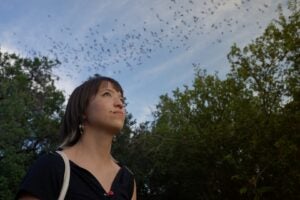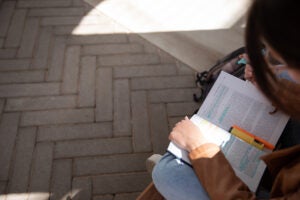AUSTIN, Texas—Dr. Yueh-Lin (Lynn) Loo, assistant professor of chemical engineering, and Dr. Lauren Ancel Meyers, assistant professor of integrative biology, have been named to the 2004 list of the world’s 100 Top Young Innovators by Technology Review, The University of Texas at Austin announced today (Sept. 20).
The TR100, chosen by an elite panel of judges and the editors of Technology Review, the Massachusetts Institute of Technology (MIT) magazine of innovation, consists of 100 individuals under age 35 whose innovative work in technology has a profound impact on today’s world.
Loo is credited with inventing an inexpensive, non-toxic and quick process for making organic electronics and plastic circuits—individual electronic devices and circuits built from carbon-containing materials on flexible plastics.
Meyers developed a mathematical model to predict the spread of infectious diseases for use by decision makers seeking to reduce their spread. The two will be honored at MIT during the magazine’s Emerging Technologies Conference from Sept. 29-30, where Meyers will discuss her innovation as part of a panel of awardees.
Organic electronics are promising alternatives to silicon devices in many emerging applications, such as large-area flexible displays, low-cost memory, and disposable and wearable electronics. They have also been proposed for use in therapeutic and diagnostic medicine. While organic devices may not operate at speeds of silicon devices, organic devices built on flexible plastics have many advantages over their silicon counterparts: they can be built over large areas (no longer limited by the size of the silicon wafer), they promise to be low cost, and they are mechanically flexible and bendable.
In creating organic electronics, Loo recognized the methods developed to make silicon devices were inherently incompatible with the materials she uses.
“Organic materials and silicon are completely different beasts, but engineers first experimenting with organic materials just reverted to established silicon techniques when building organic devices,” says Loo. “However, those techniques have well-established shortcomings: they use toxic chemicals that are harmful to organic electronic materials, expensive equipment and time-consuming processes.”
To fix this problem, Loo invented nanotransfer printing (nTP), a printing method that does not require any solvents. Her nTP is much like offset printing; she creates raised and recessed regions on a pliable, “elastomeric” stamp that resembles the circuit’s design. Using this stamp, circuit components can then be directly transferred onto flexible plastics without subsequent etching procedures. The entire stamping process takes only 30 seconds, and the circuits can be made “as big as you want,” according to Loo.
Meyers developed a new mathematical model of epidemics while working with researchers at the University of British Columbia Centre for Disease Control during the 2003 Canadian outbreak of severe acute respiratory syndrome (SARS). The model is based on how people come into contact with each other, and can be personalized to accurately predict the spread of a disease in any health-care setting or community. Public officials and health-care professionals will be able to apply the model to studying possible courses of action before making decisions.
Meyers has received funding from organizations such as the National Science Foundation, the Canadian Institute of Health Research and the Santa Fe Institute. An associate editor for the Journal of Molecular Evolution, she has published more than a dozen papers. Meyers has been interviewed about her research by media that includes Newsweek, National Public Radio and Wired News.
She joined the university faculty in 2003 after completing a National Science Foundation postdoctoral fellowship at the Santa Fe Institute, Emory University and the University of Houston. She obtained a bachelor’s in mathematics and philosophy from Harvard University and her doctor’s degree in biology at Stanford University.
Note: More information on ETC2004 can be found on the Emerging Technologies Conference Web site. Contact 512-232-0765 or brodriguez@mail.utexas.edu for a photo of Dr. Ancel Meyers.
For more information contact: Becky Rische, College of Engineering, 512-471-7272, and Barbra Rodriguez, College of Natural Sciences, 512-232-0675.



